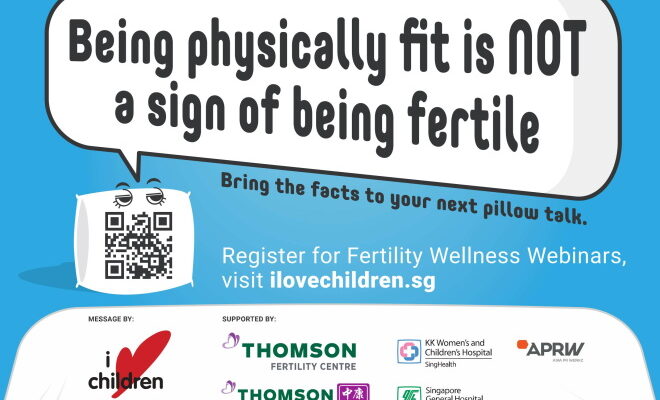
The Gen XY Lifestyle
Being aware of your fertility health can help with planning for the future
Couples that are planning for children, and who are worried about conditions that might affect their fertility health can tap on the Know Your Fertility Wellness campaign for information and steps.
The annual Know Your Fertility Wellness Campaign by I Love Children continues to run. In a previous article, we shared about some key highlights of the campaign, along with the focus on getting information, steps and processes regarding fertility and fertility treatments shared to couples.
To make fertility health checks more accessible, Thomson Fertility Centre will be giving 200 fertility health checks to couples for them to better understand their fertility health and Thomson Chinese Medicine will be giving 50 TCM fertility consultations to couples. Interested couples can sign up for the package at this website. Each fertility health check and Traditional Chinese Medicine Fertility Consultation is worth SGD 400 and SGD 200 respectively.
Doctors and experts from KK Women’s and Children’s Hospital, Singapore General Hospital, Thomson Fertility Centre and Thomson Chinese Medicine will be sharing educational fertility-related facts and information through a series of videos on I Love Children’s TikTok page.
@ilovechildrensg #TTC does not have to be sleepless nights researching. Sign up to receive your fertility health check to know more about your fertility wellness! #fyp
♬ SHIMMY SONGTRADR 30 HIT WONDER – Artist manager manager
@ilovechildrensg Wondering why you are not getting pregnant? #gynaecologist shares 4 possible reasons why #fertilityhealth
♬ Courtroom – Jacob Yoffee
We had a candid discussion with Mrs Joni Ong, President of I Love Children and Dr Janice Tung, Consultant O&G at Thomson Fertility Centre about wanting and planning for children, as well as what fertility treatment can do and the mindset couples can bring to the process.
the Active Age (AA): In your opinion, what are some of the reasons Singapore couples decide not to have, or delay having children?
Mrs. Joni Ong (JO): Based on the extensive research that I Love Children (ILC) has done over the years, we found that it is not for the lack of want that couples in Singapore are not having children. In a survey that we conducted in 2019, we found that 77 percent of 200 newly-wed respondents indicated that they want to have a child within three years of getting married.
However, more couples are marrying later with the median age of first marriages in Singapore being 30.4 years old for men and 28.8 years old for women, as of 2020. On top of that, couples typically want to spend the first few years of their marriage alone before trying to conceive and would often seek fertility consultation or treatment after more than a year of trying without any success. Therefore, the average age of women seeking help is at 35 years old.
As the outcomes of fertility treatments are affected by age and fertility potential in women steadily declines after 35 years old, the chances of conception are affected.
AA: Has the pandemic changed any of these reasons?
JO: Although we do not have data on how the pandemic affected couples to decide not to have or delay having children, it is possible that the pandemic played a part in further delaying dating or marriage. Therefore, it is even more crucial for us to raise awareness of fertility health and to encourage more couples to go for their fertility health checks as early as possible.
AA: What are three things that couples have to know about wanting a
family, or seeking to improve their chances of having a family?
JO: Firstly, I would like to encourage all couples to go for a fertility health check together, as soon as possible. Being aware of their fertility health can affect their choices when planning for the future. Many couples are unaware of their own fertility health and the chances of a natural conception can be further delayed especially for couples with undiagnosed fertility conditions. If fertility issues were discovered earlier, couples could seek timely treatments and increase their chances of conceiving.
Secondly, good general health does not mean good fertility health. Fertility health checks are not just for those who have difficulties conceiving but it is for all couples to better understand their fertility health and take the necessary actions before it is too late.
Lastly, couples need to know that it takes two to complete a fertility health check. It is not the responsibility of only one party as fertility issues are shared by both the males and females. There is no shame in going for a fertility health check rather, it is a step in taking charge of their own
fertility wellness.

I hope that couples will bring these pointers to their next pillow talk to have an open and needful conversation with their spouse.
AA: Can you share more details about what fertility treatment is, for a
couple that consults with you?
Dr. Janice Tung (JT): Treatments for fertility include inducing ovulation with oral medications or injections, intrauterine insemination, in vitro-fertilisation (IVF) and surgery. For example, hydrosalpinx, endometriosis or fibroids. Ancillary medications such as antioxidant supplementation and immune therapies may be prescribed.
Each of the various treatments generally follow a typical menstrual-cycle length, which is about a month. I will explore with each couple the timeframes they are looking at. For example, 6 cycles of ovulation induction, or 3 cycles of intrauterine insemination.
Couples may look up our website for more information on fertility health checks and treatment options.
AA: What are the main challenges when it comes to fertility treatment for couples?
JT: One of the main challenges is cost. The costs of fertility treatments, especially in vitro-fertilisation (IVF), are a financial burden for many couples. In some cases, it can even be a limiting factor for couples to obtain the treatment that they need. The government provides a generous grant for eligible couples in fertility centres within the restructured hospitals.
However, there is also a pressing need to address the workload and long intervals to start IVF within these centres, more so since treatment is time-sensitive. Treatments may be very disjointed for couples as their fertility journey could be long, straddling various clinics.
As doctors, we try our best to find a balance between costs and possible benefits to couples for various fertility treatments.
Another main challenge is that couples receive confusing advice and information from various sources including the internet. As such, they may miss a window of opportunity for fertility treatments. As fertility treatments are stressful and couples can be understandably anxious and frustrated with their journeys, we need to be patient and empathetic during this process.
AA: What mindset should the couple bring to the treatment that can
improve their chances of a successful treatment?
JT: Couples need to understand that patience is required since disappointment is expected more often than not with fertility treatments.
The success of the outcome may not necessarily be associated with how hard you have tried. Therefore, we should try to stay positive and look forward. Aligning goals and timeframes will help.
The important thing is to try. Keeping communication open, honest and supportive, as fertility treatments can be very stressful. The couple has to work together, and work with the IVF clinician, lab embryologists and the team of nurses.
AA: What is a realistic outcome that couples should look at, or expect
when undergoing treatment?
JT: In general, even for IVF, treatment is thought to be about 30 percent effective. This decreases to 10 percent in couples above 40 years of age. However, it is important to get a detailed medical opinion for your difficulty in conceiving as there are various factors that may lead to better or worse expectations.









